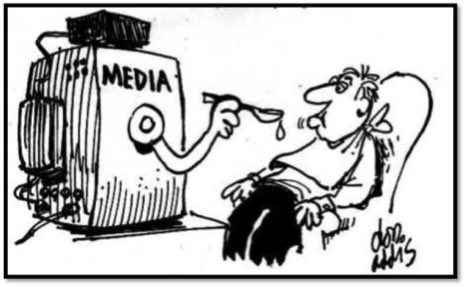Whilst no political system is perfect some are better than others in safeguarding democracy especially when there’s an inbuilt ability to challenge media bias and untruthful reporting, which as we know, becomes more and more difficult when there’s a decreasing number of corporates owning most of the major media companies.
However……
A political system of Swiss-style direct democracy, where citizens have the power to make decisions on laws and policies directly rather than through solely via elected representatives, fosters a unique dynamic that holds the possibility of driving honesty in the media.
Why?
In Switzerland, citizens regularly vote on a wide range of issues through referendums and initiatives, making the need for accurate and comprehensive information critically important.
The media's role in providing this information becomes paramount, compelling them to maintain higher standards of integrity and honesty.
In Swiss direct democracy, misinformation and biased reporting can have immediate and tangible effects on the outcomes of votes and referendums. Because citizens directly influence decision-making processes, any manipulation or dishonesty in the media can lead to misguided policies and loss of trust.
This potential for direct impact means that media organizations are subject to intense scrutiny from the public, who depend on them for factual and balanced reporting. The constant vigilance of an informed electorate acts as a powerful incentive for media outlets to be transparent and truthful.
Additionally, the Swiss system encourages the emergence of diverse media outlets that represent a wide range of perspectives and interests. Given the decentralization of power and the active participation of citizens, there is a demand for varied sources of information.
This diversity ensures that no single narrative dominates the discourse, reducing the likelihood of widespread misinformation. Media outlets that engage in dishonest practices are quickly identified and discredited by the public and competing media sources.
The direct feedback loop between citizens and media in Switzerland is another crucial factor. Swiss citizens are highly engaged and active in political discussions, fostering a culture of accountability.
Media organizations are held accountable by the very people who consume their content. This engagement encourages investigative journalism and fact-checking, as citizens demand thorough and accurate reporting to make informed decisions.
As I said, no system is perfect and some Swiss agencies have been complicit in leading people towards biased information and outcomes. All I’m saying here, is that in countries without direct democracy, it’s infinitesimally easier by comparison.
The transparency inherent in Swiss direct democratic processes extends to the media environment. Policies and legislative processes are more open to public scrutiny, making it harder for media outlets to distort facts without being exposed.
The collective participation of citizens in governance creates a robust system of checks and balances, where misleading information can be swiftly challenged and corrected by the public.
Overall, the interplay between Swiss-style direct democracy and the media cultivates an environment where honesty and integrity in journalism are essential. The need for accurate information, combined with public scrutiny and diverse media representation, drives media organizations to uphold high ethical standards.
In such a system, the media is not just a passive observer but an active participant in ensuring that citizens are well-informed and capable of making sound decisions for the collective good.
Do you think there’s a need to rescue media from capture, and does your political system guarantee or strive to guarantee that? Also does it reject citizen journalism whilst only recognizing institutional reporting? Someone once said “in many advisors there is wisdom”

Kommentarer